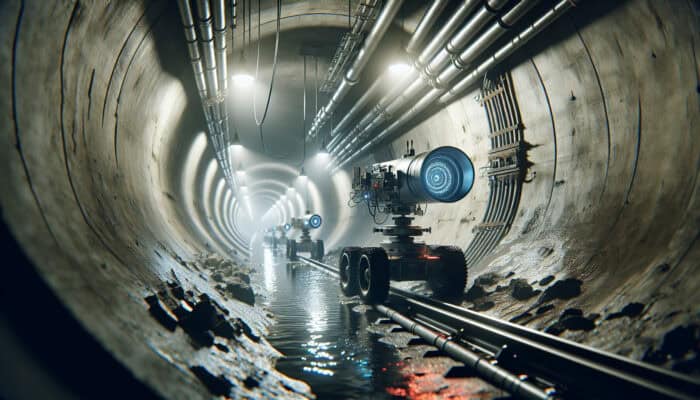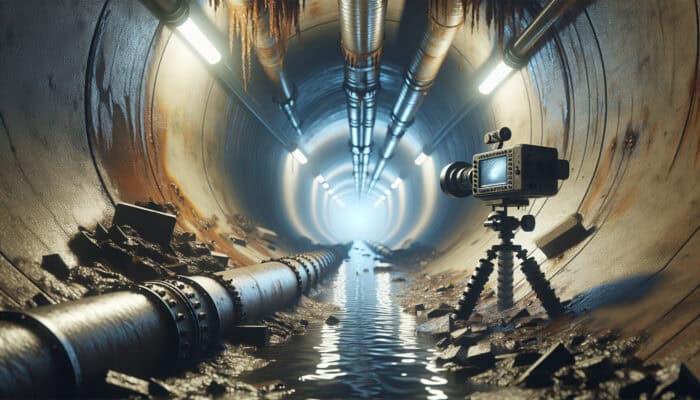Thorough Guide to Sewer Inspection Services in Mission for Enhanced Community Wellbeing
Discovering the Essential Role of Sewer Inspections in Maintaining Infrastructure and Protecting Public Health

Sewer inspections are crucial for ensuring the health and safety of communities, particularly in urban areas like Mission, Canada, where robust infrastructure is essential for everyday life. Proactively conducting these inspections allows for the early identification of potential issues within sewer systems before they escalate into serious problems that could disrupt services or threaten public safety. The benefits of regular sewer inspections are linked to several key factors:
- Preventive Maintenance: Early detection of issues can dramatically reduce the chances of incurring costly repairs in the future.
- Public Health Safety: Maintaining sanitary conditions allows communities to minimise the risk of disease outbreaks, thus safeguarding public health.
- Environmental Protection: Consistent inspections are vital in preventing leaks that could negatively impact local water supplies and diverse ecosystems.
- Regulatory Compliance: Routine inspections facilitate adherence to local and national regulations governing sewer systems.
- Property Valuation: Regular inspections can enhance property values and increase their market appeal.
- Operational Efficiency: Inspections ensure that sewer systems operate at optimal levels, promoting seamless functionality.
Innovative Approaches to Sewer Inspections Adopted Across Canada
In Canada, a variety of advanced technologies and methodologies are utilised to conduct effective sewer inspections. Techniques such as Closed-Circuit Television (CCTV) systems, sonar technology, and cutting-edge robotic devices provide unique insights into the condition and structural integrity of sewer infrastructure. These methods facilitate timely interventions and necessary repairs, ultimately enhancing the overall health of the sewer system.
The Influence of Canadian Regulations on Sewer Inspection Procedures
The sewer inspection process in Canada is governed by strict regulations aimed at upholding safety standards and compliance. These guidelines, established by local municipalities and environmental agencies, dictate the frequency and methodologies for conducting inspections, which are essential for protecting public health and ensuring infrastructure integrity. Adhering to these regulations not only guarantees compliance but also builds community trust in sewer management practices.
Choosing a Reliable Sewer Inspection Service in Mission: Key Considerations

When on the lookout for a dependable sewer inspection service in Mission, it is crucial to assess various factors, including the company’s experience, technology used, and feedback from clients. Engaging local providers who possess an in-depth understanding of the specific challenges faced by the Mission area will yield optimal results and ensure high-quality service tailored to the unique local needs.
Comprehensive Examination of Sewer Inspection Services in Mission
Recent Technological Innovations Transforming Sewer Inspection Practices
Incorporating advanced technologies into sewer inspection services is fundamentally transforming how municipalities approach this critical task. Tools such as high-definition CCTV systems, drone technology, and AI-driven analytical software are being utilised to enhance the precision and quality of inspections. For example, municipalities in British Columbia have successfully employed drone technology to assess hard-to-reach sewer areas, resulting in increased efficiency and improved safety during the inspection process.
Industry Guidelines for Scheduling Effective Sewer Inspections

Experts typically recommend that property owners schedule sewer inspections at least every two years. For older systems or those with a documented history of issues, more frequent evaluations are advisable. Inspections should ideally be conducted before winter months and after heavy rainfall, as these periods can exert additional stress on sewer systems. Establishing a consistent maintenance schedule is vital for prolonging the lifespan of sewer infrastructure.
Insights from Successful Sewer Inspection Case Studies in Canada
Numerous compelling case studies from municipalities across Canada underscore the significant advantages of routine sewer inspections. For instance, a recent initiative in Vancouver uncovered substantial blockages that could have resulted in major flooding events if left unaddressed. By addressing these issues proactively, the city not only mitigated potential repair costs but also significantly enhanced the quality of life for its residents, illustrating the value of proactive sewer management strategies.
Environmental Benefits Associated with Regular Sewer Inspections
Routine sewer inspections are essential for promoting environmental sustainability. By identifying leaks and potential contamination sources early on, municipalities can prevent harmful substances from entering local waterways. In Mission, successful initiatives have been launched to reduce sewer overflow incidents, resulting in cleaner streams and healthier ecosystems, which positively impact local wildlife and enhance the overall health of the community.
Preparing Effectively for a Sewer Inspection: A Guide for Property Owners
In order to facilitate a smooth sewer inspection process, property owners should undertake several proactive measures. Proper preparation can significantly improve the efficiency of inspections. Key preparation tips include:
- Clear Access: Ensure that all access points to the sewer system are unobstructed, allowing easy entry for inspection teams.
- Document Previous Issues: Provide inspectors with records of any past sewer-related problems to assist in their evaluation.
- Notify Residents: Inform tenants or residents about the upcoming inspection to ensure their cooperation during the process.
- Check for Blockages: Remove any visible obstructions near sewer access points to enable an unobstructed inspection.
Common pitfalls to avoid include neglecting to inform the inspection team about any prior issues or failing to adequately prepare access points for the inspection team, which can lead to delays and complications.
A Detailed Guide to the Sewer Inspection Process in Mission
Step-by-Step Breakdown of a Comprehensive Sewer Inspection
The sewer inspection process typically commences with a preliminary assessment conducted by skilled professionals who evaluate the overall condition of the sewer system. This initial evaluation is followed by deploying specialised inspection equipment, such as CCTV cameras, to gather detailed insights regarding the condition of the system. After a thorough analysis, a comprehensive report is generated, detailing findings and providing recommendations for necessary repairs or maintenance actions.
Essential Tools and Equipment Utilised in Sewer Inspections
In Mission, a variety of specialised tools and equipment are employed during sewer inspections. These include:
- CCTV Cameras: Utilised for visual inspections of pipeline interiors, providing real-time footage for accurate assessments.
- Sonar Equipment: Used to detect blockages and accurately measure pipe dimensions.
- Robotic Crawlers: Designed to navigate challenging areas within sewer systems, thereby enhancing inspection capabilities.
- Hydraulic Equipment: Utilised to clear blockages during inspections, ensuring unobstructed flow and precise evaluations.
Each tool serves a specific purpose, contributing to the overall effectiveness and thoroughness of the inspection process, ensuring that all aspects of the sewer system are adequately assessed.
The Crucial Role of Technicians in Conducting Comprehensive Sewer Inspections
Technicians play an instrumental role in executing sewer inspections, requiring a unique blend of skills and expertise. Their primary responsibilities include operating inspection equipment, analysing collected data, and preparing detailed reports for property owners and municipalities. Essential skills for technicians encompass:
- Technical Proficiency: The competency to operate complex inspection equipment effectively and safely.
- Analytical Skills: The ability to accurately interpret collected data and efficiently diagnose potential issues.
- Problem-Solving: Skills necessary to recommend effective solutions based on inspection findings, ensuring that issues are addressed promptly.
- Communication: The capacity to convey technical information clearly and understandably to non-expert audiences, facilitating better comprehension.
Each of these competencies is vital for ensuring that sewer systems are maintained in optimal condition, functioning efficiently for the benefit of the entire community.
The Valuable Advantages of Sewer Inspection Services for Mission Residents
How Proactive Issue Detection Prevents Expensive Repairs
Regular sewer inspections serve as a crucial mechanism for preventing costly repairs for property owners in Mission. By identifying issues such as cracks or blockages at an early stage, property owners can substantially reduce the risk of extensive damage that could lead to significant repair costs. Investing in routine inspections is a proactive strategy that pays dividends over time, safeguarding both finances and property integrity.
The Essential Role of Sewer Inspections in Enhancing Public Health and Safety
The implications of sewer inspections extend beyond mere infrastructure maintenance; these inspections are essential for ensuring public health and safety. Well-maintained sewer systems are instrumental in preventing sewage leaks and overflows that pose serious health risks, including waterborne diseases. By prioritising regular inspections, communities like Mission can uphold sanitary conditions, significantly improving the quality of life for their residents.
The Contribution of Effective Sewer Management to Environmental Protection
Effective sewer management, bolstered by consistent inspections, plays a pivotal role in advancing environmental protection initiatives throughout Canada. By identifying leaks and potential contamination sources, communities can proactively address issues that threaten local ecosystems and wildlife. This commitment to environmental stewardship is particularly evident in Mission, where initiatives centred on improved sewer management have resulted in cleaner waterways and healthier habitats for local flora and fauna.
The Influence of Regular Sewer Inspections on Property Value and Marketability
For homeowners and real estate investors, conducting regular sewer inspections can significantly enhance property values and marketability. Today’s buyers are increasingly aware of the importance of a well-maintained sewer system, perceiving inspections as a critical component of property assessments. Ensuring that sewer systems are in excellent condition can make properties more attractive to potential buyers, thereby increasing overall market value.
Strategic Approaches to Optimising Sewer Inspection Services in Mission
Best Practices for Conducting Effective Sewer Inspections
Implementing best practices in sewer inspections is vital for achieving high-quality results. Key strategies include thorough pre-inspection preparations, employing the latest technologies, and maintaining open communication with property owners throughout the inspection process. By adhering to these guidelines, inspection teams can maximise efficiency and accuracy in their assessments, ensuring comprehensive evaluations that effectively address all potential issues.
The Significance of Training and Certification for Sewer Inspection Professionals
Ongoing training and certification for professionals in the sewer inspection industry are essential for maintaining high service standards. These programs equip technicians with the latest knowledge and skills necessary to navigate evolving technologies and comply with regulatory requirements. Investing in professional development ensures that inspection services remain authoritative, reliable, and capable of meeting the diverse needs of the community.
Common Challenges Faced During Sewer Inspections
Technicians often encounter challenges during sewer inspections in Canada, including restricted access, aging infrastructure, and various environmental factors. Effectively addressing these challenges often requires innovative solutions, such as using robotic technology for hard-to-reach areas or adjusting inspection schedules based on weather conditions. By proactively tackling these obstacles, municipalities can ensure more effective inspections and achieve better outcomes for their communities.
Emerging Trends in Sewer Inspection Services in Mission
The Role of Smart Technology in Transforming Sewer Inspections
Emerging smart technologies are set to revolutionise sewer inspections across Canada. Innovations such as IoT (Internet of Things) sensors and cloud-based analytics are reshaping how municipalities monitor and manage sewer systems. These advanced technologies enable real-time data collection and analysis, allowing for swift responses to potential issues and significantly enhancing overall system management and efficiency.
Integrating Sustainable Practices into Sewer Inspection Services
Canadian sewer inspection services are increasingly adopting sustainable practices aimed at minimising their environmental impact. This includes utilising eco-friendly materials and methods in repair and maintenance procedures. By prioritising sustainability, municipalities not only contribute to broader environmental goals but also ensure effective sewer management that aligns with community values and fosters public trust.
The Future Potential of Artificial Intelligence in Sewer Inspections
The future applications of AI in sewer inspections are vast and promising. AI technology has the potential to enhance predictive analytics capabilities, enabling municipalities to foresee potential issues based on historical data and usage trends. As technological advancements continue, AI is poised to become an integral aspect of optimising sewer management systems and ensuring compliance with environmental standards.
Frequently Asked Questions About Sewer Inspection Services
What Is Included in a Sewer Inspection Service?
A sewer inspection service involves a comprehensive assessment of sewer lines using specialised equipment to identify potential issues such as blockages, cracks, or leaks, thereby ensuring the integrity of the infrastructure.
How Often Should Sewer Inspections Be Conducted?
It is generally recommended to conduct sewer inspections every two years; however, older systems or those with documented issues may necessitate more frequent evaluations to ensure ongoing integrity.
What Technologies Are Typically Used in Sewer Inspections?
Common technologies utilised during sewer inspections include CCTV cameras, sonar equipment, and robotic crawlers, which provide detailed insights into the current condition of sewer systems and improve assessment accuracy.
Why Are Sewer Inspections Critical for Public Health Protection?
Regular sewer inspections are essential for preventing leaks and overflows, which help maintain sanitary conditions and reduce the risk of waterborne diseases, ultimately safeguarding public health and safety.
What Preparations Should Property Owners Undertake Before a Sewer Inspection?
Property owners should ensure access points are clear, document any previous issues, inform residents about the inspection, and check for visible blockages prior to the assessment to facilitate a smooth process.
Can Consistent Sewer Inspections Enhance Property Value?
Absolutely, regular sewer inspections can significantly boost property values by ensuring the sewer system is functional and well-maintained, making properties more appealing to potential buyers.
What Challenges Do Technicians Encounter During Sewer Inspections?
Technicians may face challenges such as limited access, aging infrastructure, and adverse environmental conditions, all of which can complicate the inspection process and necessitate adaptive strategies for resolution.
How Does AI Enhance the Sewer Inspection Process?
AI improves sewer inspections through predictive analytics and data analysis, allowing municipalities to proactively identify potential issues based on historical usage data and enhance overall management strategies.
What Role Do Regulations Play in Sewer Inspection Services?
Regulations established by local municipalities and environmental agencies define the standards and procedures for sewer inspections, ensuring compliance, safety, and the preservation of public health.
How Can Municipalities Foster Sustainable Practices in Sewer Inspections?
Municipalities can adopt eco-friendly materials and methods, implement cost-effective technologies, and prioritise environmental stewardship in their overall sewer management strategies to promote sustainability.
Connect with us on Facebook for More Insights!
The Article: Sewer Inspection Services in Mission: Ensuring Canadian Infrastructure Health First Published On: https://pacificbluemechanical.ca/
The Article Sewer Inspection Services: Safeguarding Mission’s Infrastructure Was Found On https://limitsofstrategy.com
References:
Sewer Inspection Services: Safeguarding Mission’s Infrastructure
Sewer Inspection Services for Protecting Mission’s Infrastructure



